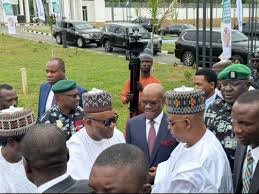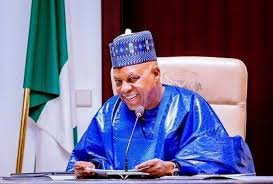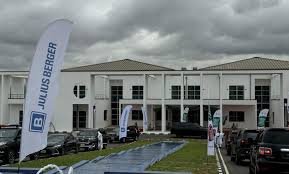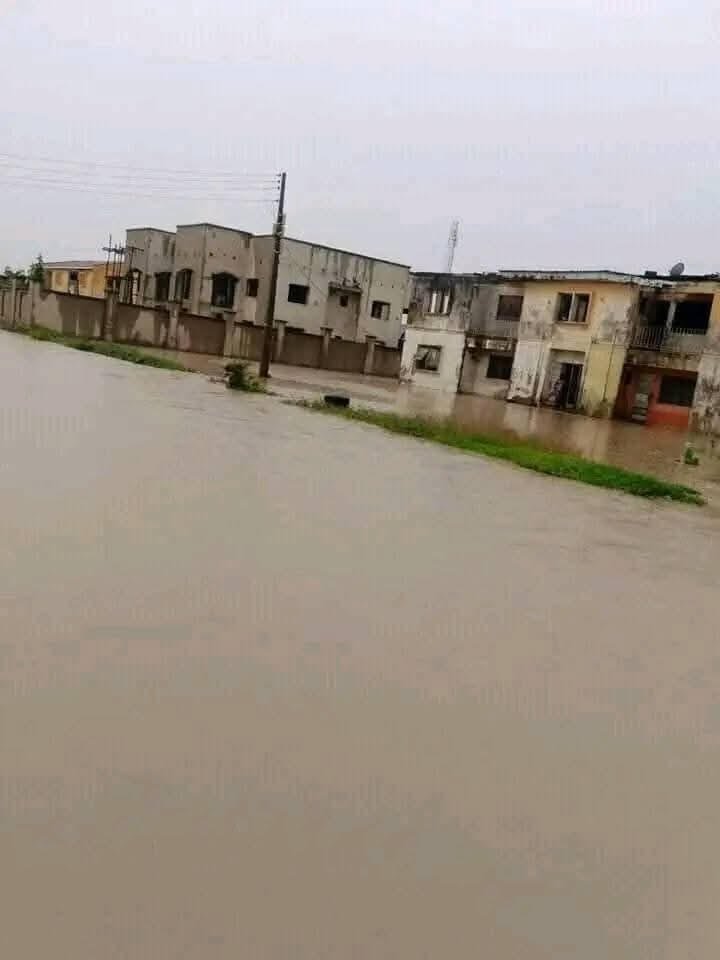The decision by President Bola Tinubu to spend N15 billion on renovating his Vice, Kashim Shettima’s Lagos quarters and N10 billion on digitalizing the State House and Lagos State offices and quarters has sparked outrage, especially considering the country’s minimum wage agitations and worsening economy.

Despite the country’s falling economic and increasing hardships, the Federal Government shockingly went ahead with its decision to splurge billions of naira on renovating the Vice President’s official residence. As Nigerians struggle to make ends meet, they have raised questions about the government’s priorities, demanding that Tinubu revamps the economy instead of lavishing scarce resources.
In light of this, Juliet Jacob reports that angry citizens are calling for prioritizing public welfare rather than luxury renovations
Outrage Against Government
Nigeria’s Federal Government has sparked widespread outrage with its recent decision to allocate ₦5 billion for renovating the Vice President’s official residence in Lagos and an additional ₦15 billion for building a new residence in Abuja.
This move has raised eyebrows, considering the country’s dire economic situation, with millions struggling to make ends meet amidst poverty, unemployment, and a crumbling healthcare system.
The total expenditure of ₦20.5 billion for the Vice President’s residences has been criticized for being excessive, especially when compared to the meagre budget of ₦5 billion allocated for student loans.
Critics argue that this lavish spending prioritizes luxury over essential public services, neglecting critical areas such as healthcare, education, and human development.
For instance, the amount allocated for the Vice President’s residences could cover the annual salaries of approximately 3,000 professors, many of whom earn around ₦400,000 in Nigerian universities.

The timing of this expenditure is particularly concerning, given the nation’s escalating inflation rate, which reached 33.69% in April 2024, and the ongoing minimum wage agitations by labour unions.
The Expenditure: A Breakdown
Data from GovSpend, a civic tech platform, reveals that between May and September 2024:
- May 31, 2024: ₦2.8 billion was paid to Denderi Investment Limited for renovations in Lagos.
- September 5, 2024: ₦726 million and ₦1.48 billion were paid to the same firm for additional renovation phases.
In Abuja, the Federal Capital Territory Administration disclosed plans to spend ₦15 billion to construct a new residence for the Vice President. This comes alongside a ₦61.5 billion supplementary budget, raising questions about the administration’s commitment to reducing governance costs.
A Nation in Crisis: Alternative Uses of ₦20 Billion
Nigeria’s rural communities are facing a dire healthcare crisis, with limited access to primary healthcare services leading to alarming rates of maternal deaths, malaria, and a reliance on expensive pharmacies.
This reality is compounded by the fact that many pregnant women in rural areas lack access to skilled pregnancy care, resulting in an estimated 67,000 maternal deaths in 2017.
The situation is further exacerbated by factors such as financial constraints, lack of decision-making power, and poor understanding of health, which prevent women from seeking essential medical services.
Critics
Critics say with ₦20 billion, 20 primary health centers could be built, providing essential medical services to underserved areas and reducing mortality rates.
This investment would not only save lives but also create jobs for healthcare professionals, contributing to the overall development of the community.
Experts recommend addressing individual, community, and institutional factors, including health policies and governance, to improve access to skilled pregnancy care, rather than servicing few government officials, at the expense of the people.
Education Sector in Shambles
Nigeria’s education sector is facing a daunting crisis, with over 18.5 million children out of school, struggling with dilapidated infrastructure and underfunded systems.
This staggering number represents one in every five of the world’s out-of-school children, highlighting the urgent need for reform.
The current state of education in Nigeria is marred by weak curriculum, inadequate teacher qualification, and poor infrastructure, ultimately affecting the quality of education.
The federal government’s decision to allocate ₦20 billion for renovating the Vice President’s official residence has continued to spark outrage, with many questioning the priority given to luxury over education.
“Imagine the impact if these funds were redirected to build or renovate schools? It could significantly improve enrolment, enhance learning environments, and create employment opportunities for teachers”, said Mr Olusola Kareem, a phone dealer in Abuja.
Critics say with a reported 75% of children aged 7-14 lacking basic literacy and numeracy skills, investing in education is crucial for Nigeria’s future.
Flood Rehabilitation
Nigeria’s annual floods have become a recurring nightmare, displacing thousands and destroying critical infrastructure, including schools and hospitals.
This devastation not only disrupts the lives of affected communities but also exacerbates the country’s existing education and healthcare crises.
Critics are now questioning the government’s priorities, particularly the recent allocation of ₦20 billion for renovating the Vice President’s official residence.
They argue that these funds could be better utilized to repair flood-damaged facilities, restoring access to education and healthcare for those in dire need.
With over 18.5 million children already out of school and a healthcare system struggling to cope, the potential impact of redirecting these funds could be transformative.
They argued that by prioritizing the renovation of vital infrastructure over luxury residences, the government can help mitigate the effects of future floods and build a more resilient, equitable society for all Nigerians.
Employment Creation
Nigeria’s youth unemployment crisis has reached alarming levels, with 5.84% of young people struggling to find work, forcing many to seek opportunities abroad.
This trend not only drains the country of its brightest minds but also perpetuates a cycle of poverty and inequality.
However, experts argue that investing in critical sectors such as agriculture, healthcare, and education could be a game-changer, creating thousands of jobs and curbing the brain drain.
Rather than allocating scarce resources to build lavish houses for government officials, the focus should be on empowering the youth.
Nigeria’s growing population, with over 43% of its citizens under 14 years and 33% between 15 and 24 years, presents a significant opportunity for economic growth, but only if harnessed effectively.
Some Nigerians who spoke to Africa Health Report (AHR) argued that if the government could prioritize investments in key sectors, the country can unlock its demographic potential, reduce unemployment, and foster a more sustainable future.
Economic Hardship Post-Subsidy Removal
President Bola Tinubu’s decision to remove fuel subsidies has sent living costs soaring, sparking widespread economic hardship across Nigeria.
The sudden policy change, implemented on his inauguration day, May 29, 2023, has led to exponential increases in transportation costs, food prices, electricity tariffs, and Value Added Tax (VAT), culminating in a crippling inflation rate.
The Guild of Public Affairs Analysts of Nigeria (GPAAN) urged the Federal Government to revamp the economy and halt its drift, citing the exit of 16 multinational companies due to the harsh operating environment.
To alleviate the economic burden on millions of Nigerians, experts suggest redirecting funds from luxury renovations to public welfare initiatives.
This could include massive employment generation for Nigerian youths through farm settlements across the country, reducing taxes on citizens, and generating steady power.
By prioritizing pro-people policies, the government can attract Foreign Direct Investment (FDI) and mitigate the suffering of its citizens.
Human Development and Brain Drain
Nigeria’s healthcare system and other sectors are facing a critical crisis, with the country allocating a mere 3% of its GDP to healthcare, significantly lower than global averages.
This insufficient funding has resulted in poor working conditions, leading to a brain drain of medical professionals seeking better opportunities abroad.
The consequences are dire, with Nigeria ranking low in health status compared to other emerging nations, and boasting the world’s highest under-five mortality rate, with 117.2 infant deaths per 1000 live births.
To reverse this trend, experts advocate for increased investment in healthcare infrastructure, which would not only improve health outcomes but also stimulate economic growth.
Studies have shown that government health expenditure has a positive impact on life expectancy and reduces mortality rates.
By prioritizing healthcare spending, Nigeria can improve its citizens’ wellbeing and productivity, ultimately boosting economic performance.
Security Fosters Development
In a bid to tackle insecurity and promote development, experts are advocating for the construction of vital infrastructure in vulnerable regions.
Building community centers, schools, and health facilities can be a game-changer, fostering a sense of community and providing essential services to those in need.
This approach not only addresses the immediate needs of the population but also helps reduce crime rates by providing alternative opportunities and promoting social cohesion.
By investing in these critical facilities, governments can create a ripple effect of positive change, empowering local communities to break the cycle of poverty and violence.
Quality education, accessible healthcare, and safe community spaces are key to unlocking the potential of these regions, and ultimately, contributing to a more peaceful and prosperous society.
Backlash Over the Government’s Decision
Nigeria’s government is facing intense backlash over its decision to allocate a staggering amount of money to renovate the official residence of the Vice President.
The move has been widely criticized, with many experts and organizations labelling it a misplacement of priorities.
The Socio-Economic Rights and Accountability Project (SERAP) has described the allocation as a breach of public trust, emphasizing the need for debt reduction and improved public welfare.
Auwal Rafsanjani of the Civil Society Legislative Advocacy Centre (CISLAC) has also criticized the administration’s insincerity in reducing governance costs.
Meanwhile Debo Adeniran of the Centre for Anti-Corruption and Open Leadership (CACOL) is calling for constitutional reforms to regulate government spending and eliminate waste.
This controversy comes amid rising poverty and inflation in Nigeria, with over 133 million people multidimensionally poor.
The government’s decision to spend N15 billion on renovating the Vice President’s Lagos quarters and N10 billion on digitalizing the State House and Lagos State offices and quarters has sparked outrage, especially considering the country’s minimum wage agitations and struggling economy.
The Way Forward
Nigeria’s government is facing intense criticism for its decision to allocate a massive amount of money to renovate the Vice President’s residence, amidst the country’s dire economic and social challenges.
The timing and scale of this expenditure have raised questions about the government’s credibility, particularly when millions of Nigerians struggle with poverty, inadequate healthcare, and limited access to education.
Experts argue that redirecting these funds to essential public services like healthcare, education, and infrastructure would not only improve the lives of millions but also restore public trust in governance.
As the government prepares for the 2025 budget, it’s crucial that they prioritize investments addressing pressing needs and promoting sustainable development over luxury projects benefiting a select few.
The World Bank emphasizes Nigeria’s need to increase spending to promote economic development, highlighting the country’s extremely low revenue-to-GDP ratio of 7% in 2021.
By reallocating resources to critical sectors, Nigeria can unlock its potential and ensure a brighter future for its citizens.



